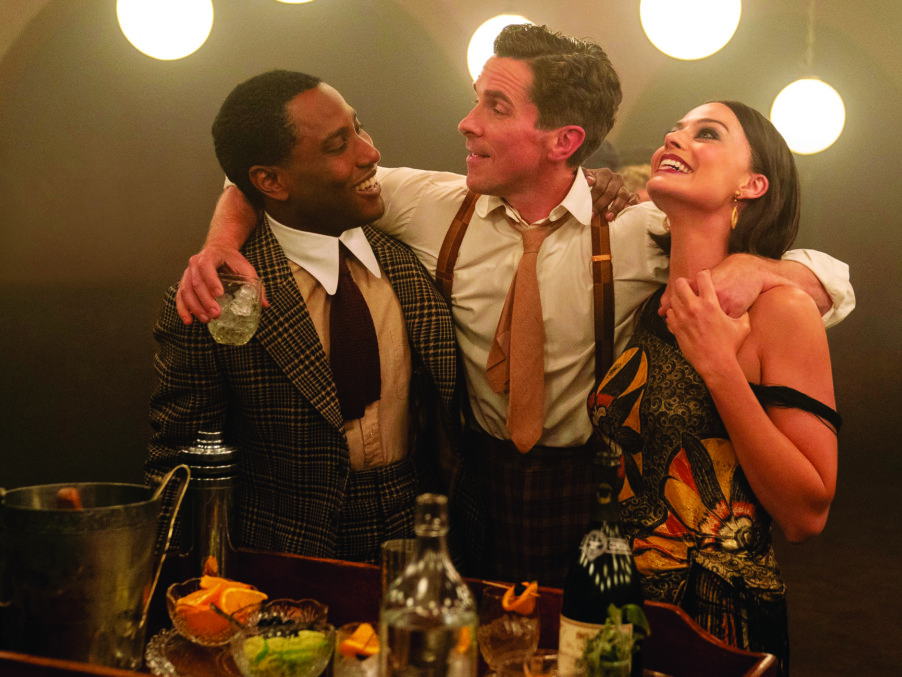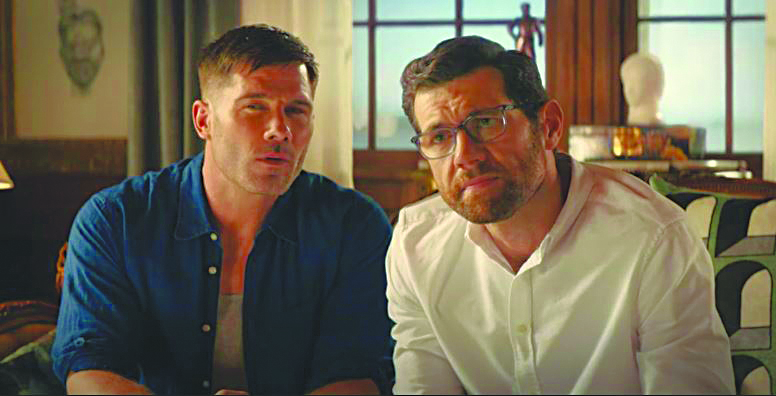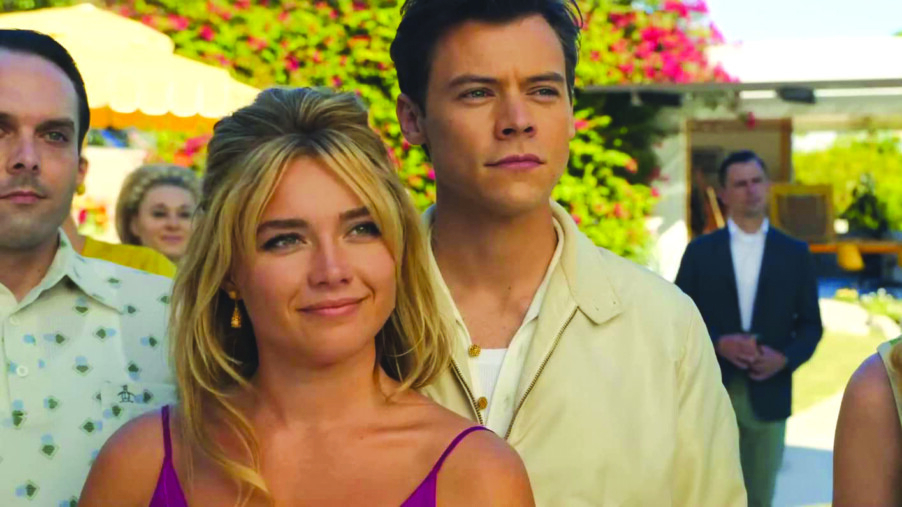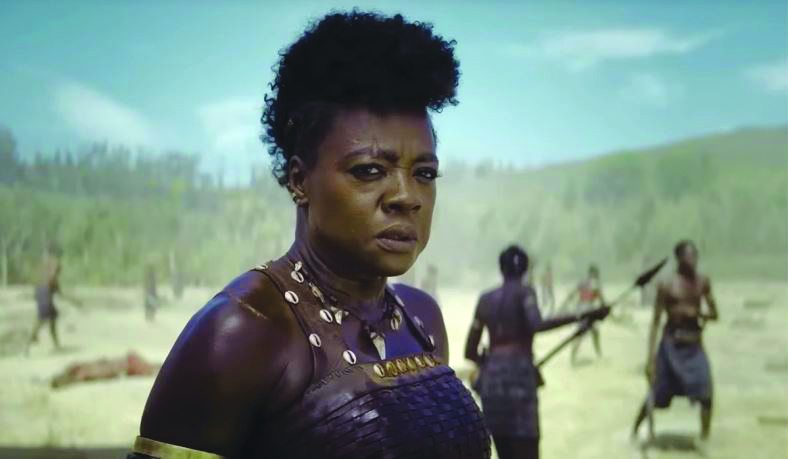Amsterdam (R)
John David Washington, Margot Robbie and Christian Bale are Americans who enjoy liberation in post-WWI Europe but find themselves tangled up in intrigue in pre-WWII New York in Amsterdam, a movie written and directed by David O. Russell that backs into a piece of history called the “Business Plot.”
Spoiler alert if you decide to dive down the Wikipedia rabbit hole of the nutty incident that is the Business Plot before seeing this movie.
In World War I, medical doctor Burt Berendsen (Bale) joins a mostly African-American Army regiment that has suffered from dangerously hostile and disrespectful leadership by white officers. Aspiring lawyer Harold Woodman (Washington) makes a deal with Burt that if Burt actually works to help the troops and keep them alive Woodman will try to keep Burt alive. When most of the regiment, Burt and Harold included, end up in a French hospital with injuries, the friendship deepens and grows to include Valerie (Robbie), an American working as a nurse.
Valerie takes the men with her to Amsterdam, where two “businessmen”— Henry Norcross (Michael Shannon), in US Naval intelligence as a chyron tells us, and Paul Canterbury (Mike Myers), really MI6 — offer to help the men receive medical treatment for their wounds and in Burt’s case an unlimited supply of glass eyes to replace the eye he lost. In exchange, Norcross and Canterbury might one day need some kind of favor from Burt and Harold, maybe a favor similar to the kind of information-passing favors Valerie did during the war. In Amsterdam the men get a rest — not just from war but from all of the constraints they suffer from at home, such as the antisemitism lobbed at Burt (including from his tony in-laws) and the deadly racism that plagues Harold and would make his romance with Valerie impossible.
Eventually Burt returns home to his wife Beatrice (Andrea Risenborough). He’s kicked out of his fancy Park Avenue medical practice because he brings veterans in for treatment — all veterans regardless of race. Eventually, Burt and Harold join forces to help veterans try to get the care and the benefits they deserve.
Which brings us to the now of the movie: 1933. Burt and Harold agree to perform an autopsy of their beloved former general when his daughter (Taylor Swift) suspects that he’s been murdered. But then she is murdered, pushed into the street by a man who points the finger at Burt and Harold. They must find out who killed the general and his daughter in order to clear their name.
A story of interwar hopefulness and romance is folded into a crime caper and it all comes together in a tale of the international political storm of the 1930s. And it’s long. And feels it.
Amsterdam meanders around, spending some time being a comedy about the buddyship of Burt and Harold, with characters played by Chris Rock and Zoe Saldana, then spending some time in a whirl of crime and early spycraft, in storylines filled with shady people with shady motives. The movie doesn’t have time to settle into any one groove. I have liked John David Washington in everything I’ve seen him in but here, like most of the people in this movie, he’s so busy ferrying the story from this moment to the next that he doesn’t really get to do much with his character. Bale goes big with his character and Robbie is, I dunno, fine, but with the vast list of movie chores for everybody to tick off it almost doesn’t even matter who we think they really are. Everybody gets a few nice moments but nobody really gets to build layers.
I appreciate the goodness that this movie seems to want to advocate for — one of its messages is “you know what’s better than war? Love and mutual respect,” which is, you know, accurate and laudable and even kind of sweet in its earnestness. But the buffet of styles and tones and everything made it too easy for whatever was the point of all this to get lost along with any really standout work from the actors. Amsterdam needed to get where it was going quicker, with more bounce and with a lot less of everything else. C+
Rated R for brief violence and bloody images, according to the MPA on filmratings.com. Written and directed by David O. Russell, Amsterdam is two hours and 14 minutes long and is distributed in theaters by 20th Century Studios.
Lyle, Lyle, Crocodile (PG)
A family moves to New York City and finds a singing crocodile living in their brownstone in Lyle, Lyle, Crocodile, a live-action musical whose songwriters include The Greatest Showman’s Benj Pasek and Justin Paul.
I mention this because the songs here had the same unremarkable-to-me feel that the Greatest Showman songs did. But now every kid who has ever dipped a toe in a theater class can bust out “This Is Me,” so my personal tastes don’t necessarily serve as a gauge of wider success. I still wouldn’t listen to that movie’s album but I do own it thanks to my kids — the same kids whom I can see wanting the album of original songs for this movie. The songs, sung by Shawn Mendes, who is Lyle’s singing voice, were half of what my kids seemed to enjoy most about the movie.
The other half was the action scenes, and with a series of people unexpectedly discovering a crocodile, there’s plenty of the wacky, chase-y, adults-screeching action that seems to resonate with kid audiences.
When we first meet Lyle, he is a gecko-sized crocodile living — and singing — in a cage in the back of a pet store. Not-so-great showman Hector P. Valenti (Javier Bardem), desperate for a new act, takes Lyle home and teaches him the movie’s first original song in hopes that they can take the performance on the road. By the time Lyle is a preschooler-sized crocodile, Hector thinks he’s ready and sets up a show, backing the expenses with the inherited brownstone he and Lyle have been living in. But when the curtain rises, Lyle can’t make a sound, and Hector loses his house. He goes on the road to earn cash and leaves Lyle, telling him to pretend he’s stuffed if anybody visits his attic home.
When the Prim family — mom (Constance Wu), dad (Scoot McNairy) and lonely eighth-grader Josh (Winslow Fegley) — moves in, they have no idea that anyone lives in the building other than themselves and the downstairs apartment dweller, Mr. Grumps (Brett Gelman). Then Josh pokes around the attic and discovers Lyle. The two become friends and Josh learns that Lyle can sing. Later Josh’s parents each discover Lyle and, after some screaming, realize the crocodile is not just friendly and tuneful but has the ability to help them work through their various adult existential stuff.
That stuff includes the father’s difficulties with his new class of chatty private-school kids and the mom’s sadness about Josh growing up plus a whole lotta baggage about her marrying Josh’s dad after the death of Josh’s mom and her, I guess, continued uneasiness with her stepmother status? Whatever the exact source of her troubles, it’s something that required just enough talking between adults that kids — mine and others in the theater where I saw the movie — were moving around, chatting, going to the bathroom, all the standard behaviors of a young audience that has lost interest in a movie. The movie comes in at around an hour and 45 minutes and I feel like the adult chatty parts could have been tightened to the “fireworks factory” faster, which in this case is a great escape from the city zoo. The hijinks of that did seem to reel younger audience members back in and leave my kids with an overall positive opinion of the movie.
And “overall positive” would probably be my judgment as well. It’s fine, with a few cute lines and some campy business from Bardem, who is not Hugh Grant in Paddington 2 but seems to be enjoying himself. The physicality of the animated Lyle in an otherwise real world is good enough; a scene of him dancing with Constance Wu is cute and well-executed. The movie doesn’t dazzle but nor does the animation get in the way. Lyle, Lyle, Crocodile is a serviceable, pleasant-enough family viewing experience. B-
Rated PG for mild peril and thematic elements, according to the MPA on filmratings.com. Directed by Josh Gordon and Will Speck with a screenplay by Will Davies (based on the book by Bernard Warber), Lyle, Lyle, Crocodile is an hour and 46 minutes long and is distributed in theaters by Columbia Pictures.
Featured photo: Amsterdam.






